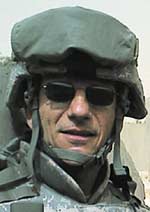Tour puts mission in perspective

Editor’s note: Army Reserve Col. Joe Heck is an emergency room physician from Henderson who left Nevada on Jan. 25 for deployment in Iraq. In civilian life, he also is a Republican state senator. Here is the last of a series of dispatches on his tour with the 325th Command Support Hospital in Anbar province, written en route home.
May 2nd — day 90.
We begin our redeployment process, retracing our route here back to the United States: first to Kuwait to clear the theater of operations, then onto Fort Benning, Ga., for outprocessing and finally, home to Henderson.
Although our mission is completed, we are unfortunately delayed in our return. There were incredible sandstorms last week that grounded all aircraft.
Iraq has been in turmoil for so long it is ironic that this area of the Middle East is considered the "Birthplace of Civilization."
The formation of a strong and focused government will set the stage for reconciliation and peace throughout the country, serving as a model for others in the Middle East. Then we in the United States can sleep easier knowing there is one less threat against us because we have helped bring Iraq into the 21st century, providing their citizens with the opportunities we cherish in our great country.
My time here was enlightening, educational, and, hopefully, made a difference. The opportunity to actually see first-hand what the United States, along with our coalition partners, is trying to accomplish in Iraq provided a perspective that cannot be obtained by reading news reports or watching the 24-hour news channels.
The many Iraqis working on the base are appreciative of our presence and the opportunity we are providing them and their country. In Ramadi, the capital of Anbar province, progress is made daily on restoring infrastructure. The civilian hospital is operating, as evidenced by a downward trend in patients coming to us.
The dam at Haditha is again generating electricity for parts of the province. Anbar remains relatively peaceful because of the security provided by U.S. forces and the cooperation of tribal leaders.
Working under relatively austere conditions provided quite an education. Learning to improvise in the delivery of health care was necessitated by somewhat limited diagnostic studies and treatment options. This experience made me appreciate the system of health care we have in America even more.
During our rotation, I believe the providers of the 325th Combat Support Hospital made a significant difference in the lives of our patients.
During the three-month period, we treated 852 patients in the emergency department. Certainly not the patient volume I am used to in Las Vegas, where we see that many patients in five days.
But each had a compelling story and presented different challenges: the young Marine who was our only fatality; the Iraqi boy who was suffering from complications because of his paraplegia caused by a mortar round; the Iraqi woman who suffered burns over 50 percent of her body; the insurgent who blew off his hands placing an IED, to list a few.
Operation Iraqi Freedom is truly a team effort. While most people read about the activities of the military personnel, there are also U.S. civilian contractors and Department of Defense civilians here as part of the reconstruction effort and supporting our troops. While my time away from home was relatively short, it made me appreciate the sacrifices of all who are contributing to bring peace and stability to Iraq.
Ultimately, a peaceful and stable Iraq will translate to a more secure United States. As the country becomes increasingly self-sufficient, the new government will build an economy that can flourish and produce positive results for its people.
While the Iraqis might be slow in developing a democracy, they have certainly embraced capitalism. A better economy will lead to better jobs, which in turn promises to deter young males from joining a Shiite militia or becoming a Sunni insurgent.
Near Narwhan, the efforts of U.S. forces to provide security and assist in rebuilding allowed a factory that once employed 10,000 people to re-open. The factory now is the largest employer in the region, with 15,000 workers, providing an alternative to criminal and terrorist activities.
It was a memorable tour of duty, an emotional one at times, and a spiritually enriching opportunity for me.
I am extremely proud to have served with many fine soldiers, sailors, airmen, and Marines and humbly hope that my medical care eased the suffering of our wounded military members. I leave Iraq proud to be an American soldier and with a renewed appreciation of our fighting men and women, our amazing country, and the freedoms we enjoy as Americans.